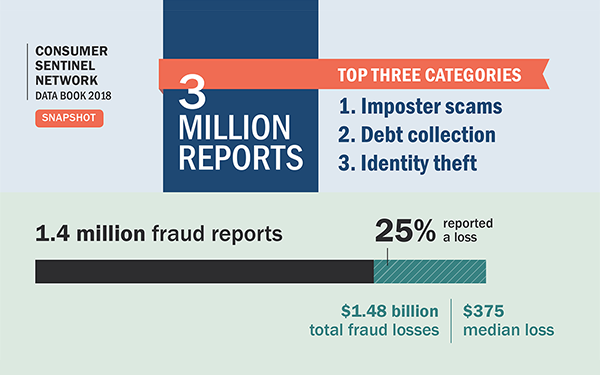For the first time, imposter scams topped the list of consumer complaints submitted in 2018 to the Federal Trade Commission’s nationwide Consumer Sentinel database, driven in part by a jump in reports about government imposter scams.

Click image to see full visual snapshot
Fraudsters operating government imposter scams falsely claim to be from the Internal Revenue Service, Social Security Administration, or another government agency to get people to turn over money or personal information. Government imposter scams made up nearly half of the 535,417 imposter scam reports to the FTC in 2018. Consumers reported losing a total of nearly $488 million to all types of imposter scams in 2018—more than any other type of fraud—and reported a median loss of $500.
Many government imposter scam reports involved fraudsters who falsely claimed to be from the Social Security Administration. These scammers typically tell people their Social Security number has been suspended, or that there is some other problem, in an effort to get them to reveal their Social Security number or pay money to “reactivate” it. In reality, Social Security numbers are never suspended and the Social Security Administration will never require you to pay to obtain one.
“If you get a call out of the blue from someone claiming to be from a government agency like the Social Security Administration or IRS asking you for personal information or money, it’s a scam,” said Andrew Smith, Director of the FTC’s Bureau of Consumer Protection. “You should hang up immediately and report it to the FTC at ftc.gov/complaint.”
Increase in Reports, Fraud Losses
In all, the FTC received nearly three million complaints from consumers in 2018. Consumers reported losing nearly $1.48 billion to fraud in 2018—38 percent more than the year before. Debt collection complaints dropped to the number two spot after topping the FTC’s list of consumer complaints for the previous three years.
Identity theft was the third most common complaint, and consistently ranks among the top consumer complaints made to the FTC. There was a 24 percent increase last year in identity theft reports that involved credit card fraud on new accounts. At the same time, there was a large drop (38 percent) in reports involving tax identity theft.
As in previous years, wire transfers and credit cards were the first and second most widely reported form of payment for fraud. In 2018, however, a growing number of consumers reported that scammers demanded to be paid with gift and reload cards. The number of consumers who said they paid with a gift or reload card grew from over 28,000 in 2017 to more than 41,000 in 2018, while the total amount paid using a gift or reload card to scammers nearly doubled to $78 million.
As in 2017, more consumers in their twenties who reported fraud said they lost money (43 percent) compared with those in their seventies (15 percent). Yet when those in their seventies reported losing money to fraud, the median amount they lost was much larger ($750), compared with those in their twenties ($400).
The data book includes national statistics, as well as a state-by-state listing of top report categories in each state, and a listing of metropolitan areas that generated the most complaints per 100,000 population. The top states in 2018 reporting fraud and other consumer issues were Florida, Georgia, and Nevada, while Georgia, Nevada, and California had the most reports about identity theft, per 100,000 population.
The FTC produces the Consumer Sentinel Network Data Book annually using reports received by the Consumer Sentinel Network. These include reports made directly by consumers to the FTC, as well as reports received by state and federal law enforcement agencies, national consumer protection organizations, and non-governmental organizations. In October 2018, the FTC began releasing consumer complaint data on a quarterly basis through a new interactive online format.
The Consumer Sentinel Network’s secure online database is currently available to more than 2,500 individual users in civil and criminal law enforcement agencies across the country and abroad. Agencies use the data to research cases, identify victims and track possible targets. Although non-governmental organizations may contribute data to the database, only law enforcement agencies can access the database. Law enforcement personnel can join Sentinel at Register.ConsumerSentinel.gov.
The Federal Trade Commission works to promote competition, and protect and educate consumers. You can learn more about consumer topics and file a consumer complaint online or by calling 1-877-FTC-HELP (382-4357). Like the FTC on Facebook, follow us on Twitter, read our blogs, and subscribe to press releases for the latest FTC news and resources.
Contact Information
CONTACT FOR CONSUMERS:
Consumer Response Center
877-382-4357
CONTACT FOR NEWS MEDIA:
Juliana Gruenwald Henderson
Office of Public Affairs
202-326-2924
STAFF CONTACT:
Monica Vaca
Bureau of Consumer Protection
202-326-2245
